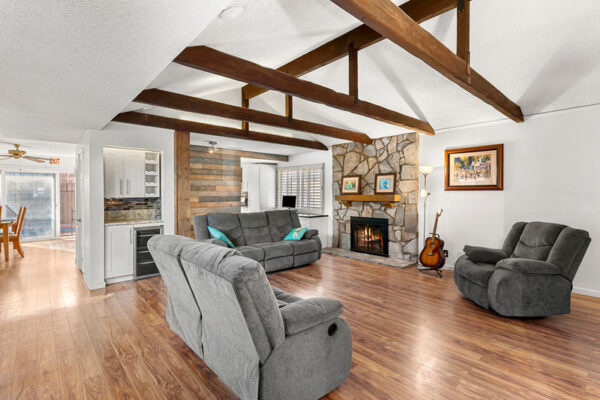Recovery is a journey, not a destination. For many, the transition from the structured environment of rehab to the demands of independent living can be overwhelming. This is where a sober living home comes into play – a supportive and structured space that serves as a bridge between intensive rehab and full independence.
At Surf City Recovery, we understand that building a new life in recovery requires time, support, and the right environment. Our sober living program in Huntington Beach helps individuals maintain their sobriety while preparing for the responsibilities and challenges of everyday life.
What is Sober Living?
Sober living homes, often referred to as transitional living facilities, provide a safe and supportive environment for individuals in recovery. These residences are free from drugs and alcohol, fostering accountability, discipline, and personal growth.
Unlike inpatient rehab, sober living allows residents to:
Live independently while adhering to house rules.
Participate in daily activities such as work, school, or volunteer programs.
Continue attending therapy, 12-step meetings, or outpatient programs.
The Role of Sober Living in Recovery
Sober living plays a critical role in helping individuals maintain their sobriety while transitioning back into society. Here’s how it bridges the gap:
A Structured Environment
Structure is key to recovery, especially in the early stages. Sober living homes provide a daily routine that includes:
Set curfews to promote discipline.
Responsibilities like household chores to foster accountability.
Scheduled group activities to encourage community bonding.
This structure helps individuals build the foundation for a stable and productive life.
Peer Support
In sober living homes, residents share their experiences and challenges with others who understand the struggles of addiction. This peer support creates a sense of camaraderie and reduces feelings of isolation.
Knowing you’re not alone in your journey can provide the motivation and encouragement needed to stay on track.
Accountability
Sober living homes have rules designed to keep residents accountable, such as:
Random drug and alcohol testing.
Regular attendance at support meetings or therapy sessions.
Adherence to curfews and other house rules.
These accountability measures reinforce personal responsibility and help residents stay committed to their recovery goals.
Life Skills Development
Addiction often disrupts essential life skills, from managing finances to maintaining healthy relationships. Sober living provides an opportunity to rebuild these skills in a supportive setting. Residents often learn:
Time management and organizational skills.
Effective communication and conflict resolution.
Strategies for managing stress and avoiding relapse.
The Benefits of Sober Living
Preventing Relapse
The period immediately after rehab is when individuals are most vulnerable to relapse. Sober living homes create a buffer, offering a stable environment where residents can focus on recovery without the pressures or temptations of their previous surroundings.
Gradual Reintegration
Re-entering society after rehab can feel daunting. Sober living provides a stepping stone, allowing individuals to transition gradually. Residents can start working, attending school, or rebuilding relationships while still having the support of a sober environment.
Building a Support Network
The connections made in a sober living home often last beyond the residency period. These relationships can form the backbone of a lifelong support network, which is vital for maintaining sobriety.
Promoting Personal Growth
In sober living, residents are encouraged to set personal goals and work toward them, whether it’s finding a job, pursuing an education, or improving their physical and mental health.
How Surf City Recovery Supports Sober Living?
At Surf City Recovery, we believe that sober living is an essential step in the recovery process. Our program is designed to provide a nurturing environment where individuals can continue their journey to independence.
What makes our Sober Living Program unique?
Supportive Community: Our sober living homes foster a sense of belonging and camaraderie, helping residents feel connected and understood.
Professional Guidance: We offer ongoing support from trained counselors and recovery specialists.
Access to Continued Care: Residents can easily participate in outpatient programs, therapy sessions, and support groups through Surf City Recovery.
Comfortable Living Spaces: Our homes are designed to provide a peaceful and positive atmosphere, promoting both physical and emotional well-being.
Preparing for a Life of Independence
While in our sober living program, residents are encouraged to:
Develop healthy routines and habits.
Set achievable short- and long-term goals.
Build self-confidence and self-sufficiency.
At Surf City Recovery, we equip our residents with the tools and skills they need to thrive in sobriety and beyond.
Who Can Benefit from Sober Living?
Sober living is ideal for anyone who:
Has completed inpatient treatment and needs additional support before living independently.
Is committed to maintaining sobriety but faces challenges at home or in their environment.
Wants to strengthen their recovery skills and build a solid foundation for the future.
Whether you’re recovering from alcohol, opioids, marijuana, or any other substance, sober living can be a crucial part of your journey.
Why Sober Living is Worth the Investment?
Recovery is a lifelong process, and investing in a strong foundation is key to long-term success. Sober living provides the stability, guidance, and community needed to navigate the early stages of sobriety with confidence.
If you or a loved one is looking for a supportive environment to continue the journey of recovery, Surf City Recovery is here to help. Contact us today to learn more about how our sober living homes can help you bridge the gap between rehab and a fulfilling, sober life.

